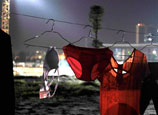
"This is a film that makes me happy and I am sure the audiences happy, too," he says.
Many of the films' gags come from Chan's two mainland scriptwriters, who have a better idea of what life in Beijing was like in the 1990s. Chan did not live in Beijing at the time the film is set, but there are some scenes he insisted on including in the final cut.
One shows the protagonist teaching in a Kentucky Fried Chicken restaurant because he does not have enough money to rent a classroom. The restaurant chain entered China in 1987 and was considered a high-status landmark at that time.
When more students started to sign up for classes, they move to a factory, because many workers were laid off in the 1990s and the factories were left empty. In the factory, hundreds of students shine torches and repeat English words.
"These scenes did not actually happen, but they are closely connected to some important moments in that era. I represent these moments in my own way of storytelling," Chan says.
He cannot make a film that is totally realistic, Chan adds. In his romance film Comrades: Almost a Love Story, he had a Hong Kong gang lord sport a tattoo of Mickey Mouse. He describes his aesthetics as a bit fantastic and super-realistic, a view of the world shaped by his background.
Born in Hong Kong, Chan moved to Thailand with his parents at age 11 and studied in the US before he returned to Hong Kong at 21. He directed The Love Letter in Hollywood in 1999, and was one of the earliest Hong Kong filmmakers to explore the mainland market.
"I always feel I am an outsider, but I accept it as a good thing," he says. "I understand things, but I stand at a distance to find something special. This point of view helps me make films that are different and fun," he says.
Chan says the making of American Dreams in China has been a delightful and relaxing experience for him. Chan says if he has learned one thing from the film, it is what a dream is.
"Everyone has his or her own dream," he says, "but often only one out of 100 people realizes his or her dream. But the reason the dream is valuable is not because of the one person who realizes it, but about how that one person makes the other 99 believe they can realize their dreams and fight for it."
The film premiered on May 17.
 |
















 China’s weekly story
China’s weekly story
(2013.5.11-5.17)


![]()
